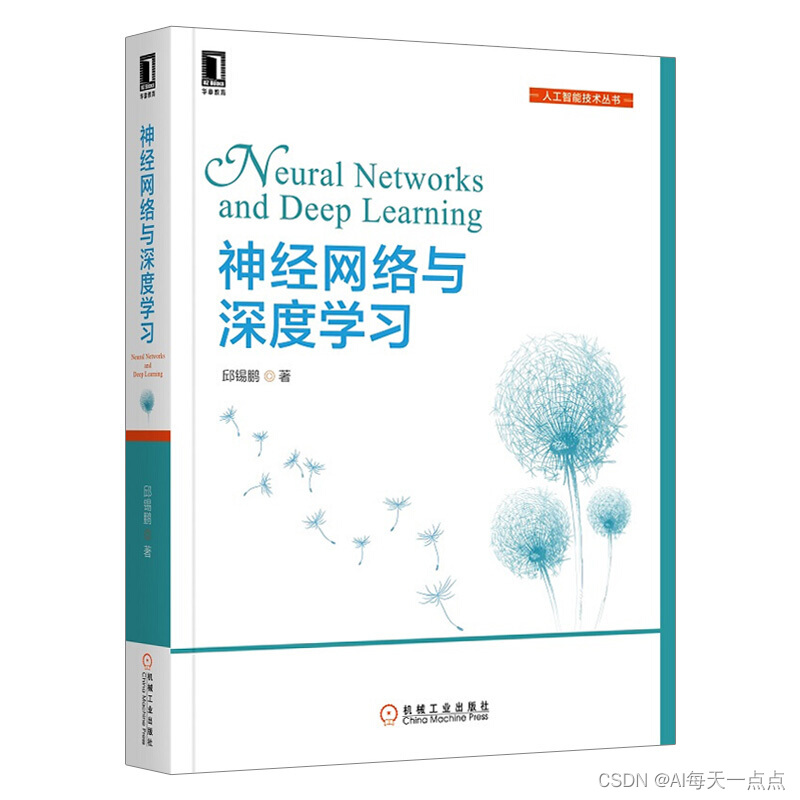Today I will share with you the "Dandelion Book" - "Neural Network and Deep Learning"
In recent years, artificial intelligence technologies represented by machine learning and knowledge graphs have gradually become popular. From license plate recognition, face recognition, voice recognition, smart assistants, recommendation systems to autonomous driving, people may use artificial intelligence technology intentionally or unintentionally in their daily lives. These technologies are inseparable from the long-term efforts of researchers in the field of artificial intelligence. Especially in recent years, thanks to the increase in data, the enhancement of computing power, the maturity of learning algorithms, and the enrichment of application scenarios, more and more people have begun to pay attention to this "new" research field: deep learning. Deep learning uses neural network as the main model, which was initially used to solve the representation learning problem in machine learning. But due to its powerful capabilities, deep learning is increasingly used to solve some general artificial intelligence problems, such as reasoning, decision-making, etc. At present, deep learning technology has achieved extensive success in academia and industry, has been highly valued, and set off a new wave of artificial intelligence.
Author introduction
Qiu Xipeng: Qiu Xipeng, professor and doctoral supervisor of Fudan University. Main fields: natural language processing, machine learning, deep learning, etc., "2020 AI 2000 Artificial Intelligence World's Most Influential Nominee Scholar", published more than 60 academic papers in high-level international journals and conferences in related fields, and won the ACL2017 Outstanding Paper Award, the top international conference in the field of natural language processing, etc., as the project leader, developed natural language processing open source projects FUdanNLP and Fast-NLP, which have been widely used in academia and industry.
Book introduction
This book systematically organizes the knowledge system of deep learning, and explains the principles, models and methods of deep learning from the shallower to the deeper, which is more suitable for Chinese readers.
Let readers have a more comprehensive grasp of the relevant knowledge of deep learning, and improve the ability to use deep learning technology to solve practical problems.
Systematic : Systematically organized the knowledge system of neural networks and deep learning. In view of the many knowledge points involved in deep learning, this book connects the knowledge points involved in deep learning from three levels: basic concepts of machine learning, neural network models, and probability graph models, so that readers can have a more systematic understanding of deep learning technology specificity, clarity and comprehensiveness.
Readability : This book is arranged from shallow to deep, and strives to be easy to understand in language expression, and understand abstract concepts by adding illustrations, examples, and necessary mathematical derivations. At the same time, the appendix briefly introduces the necessary mathematical knowledge involved in this book, which is convenient for readers to check and use.
Practical : This book is equipped with programming exercises for each chapter knowledge point on the website, so that readers can closely combine theory and practice during the learning process, deepen the understanding of knowledge points, and have the ability to analyze and solve problems.

Books + author's teaching video + 60G entry-advanced AI resource package (classic papers/books/project courses/learning route outline)+guidance with papers/study/employment/competition+Daniu technical questions and answers
Follow the public H: Gupao AI, reply 211 to get
Contains: deep learning neural network + CV computer vision learning (two major frameworks pytorch/tensorflow + source code courseware notes) + NLP
Applicable people ①Students who are preparing for graduation thesis ②AI algorithm engineers who are planning to change jobs and are looking for a job ③Those who are self-study and ready to switch to the AI field ④Those who want to consolidate core AI knowledge and fill in gaps